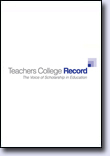The 100 Greatest Science Books list contains a mixture of classic and popular works, chosen for their accessibility and relevance. Most of the books selected are suitable for a well educated layman with only a few being for a more serious reader. The list covers the obvious subjects: biology, chemistry, and physics, as well as mathematics, the philosophy of science, and the history of science. It also includes several biographies.
Research and publish the best content.
Get Started for FREE
Sign up with Facebook Sign up with X
I don't have a Facebook or a X account
Already have an account: Login
 Your new post is loading... Your new post is loading...
 Your new post is loading... Your new post is loading...
|

Maria Claudia Londoño D's curator insight,
February 1, 2013 9:48 AM
So important to know new tools related to this matter!Tks! 
Media&Learning's curator insight,
February 18, 2013 4:55 AM
A website for free exercises to improve your reading speed and understanding abilities |



















